African Tax Administration Paper 28
The government of Ethiopia, like other governments, has provided tax response measures in order to mitigate the socio-economic impacts of COVID-19. These measures, among others, include a waiver of outstanding tax liabilities that taxpayers owe to the government; a tax amnesty or relief on interest and penalties for tax debt; and an extension of filing and tax payment deadlines. These tax measures were adopted with the purposes of helping affected businesses, to keep employees at work, to stimulate the economy and to reduce COVID-19 infections. To be effective, tax relief measures should have been targeted, temporary, speedy, abuse resistant, cost recoverable, predictable, reversible, scalable, easy to administer, resilient to health measures, and adapted to the specific needs of Ethiopia. The strong sides of the Ethiopian tax responses are their speedy nature and the fact that they consider the revenue space and address the status of the poor. The challenges observed on the design and enforcement of the tax measures include lack of adequate targeting, lack of prior assessment, administrative uneasiness, lack of records on the revenue loss, absence of monitoring and evaluation, and that they unfairly benefitted those who failed to comply with their tax duties. Prior assessment, targeted support, convenient response administration, coordination among the government organs, the need for the tax responses to be free from discrimination, the need for appropriate data recording, fair dispute settlement procedures and the need for a permanent disaster response department are suggested for similar incidents in the future.
